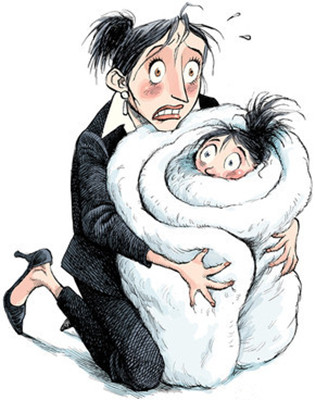壓力下的父母
Cancel that violin class
取消小提琴補習班
Helicopter moms and dads will not harm their kids if they relax a bit
揠苗助長的父母們,放松點,對孩子沒壞處。
WELL-TO-DO parents fear two things: that their children will die in a freak accident, and that they will not get into Harvard. The first fear is wildly exaggerated. The second is not, but staying awake all night worrying about it will not help—and it will make you miserable.
富裕家庭的父母害怕兩件事情:一件是他們的孩子死于意外事故,另一件是,孩子進不了哈佛讀書。第一件可能過分的夸張,第二件則絕對真實。但是擔心得夜不能寐起不到任何幫助作用,只會讓你覺得痛苦。
Modern parents see risks that their own parents never considered. They put gates at the top of stairs, affix cushions to table corners and jam plastic guards into sockets to stop small fingers from getting electrocuted. Those guards are “potential choking hazards”, jests Lenore Skenazy, the author of “Free-Range Kids”. Ms Skenazy let her nine-year-old son ride the New York subway on his own. He was thrilled; but when she spoke about it on TV, a mob of worrywarts called her “America's worst mom”.
現(xiàn)在的父母看到了他們上一輩從未注意到過的危險。他們把大門安在樓梯頂上,給桌子安上桌角防撞貼,給插座插上保護蓋以防止孩子的小手指觸電。 《自由放養(yǎng)孩子》一書作者Lenore Skenazy開玩笑的說,這些防護裝置有潛在的窒息危險。Skenazy讓她九歲的孩子自己乘坐紐約的地鐵。孩子因此非常激動,但當Skenazy在電視上講到此事,一群杞人憂天人士則說她是“美國最糟糕的母親”。

Yet in fact American children are staggeringly safe. A kid under five in the 1950s was five times as likely to die than the same kid today. The chance of a child being kidnapped and murdered by a stranger is a minuscule one in 1.5m.
然而,事實上美國的孩子們異常安全。在二十世紀五十年代,5歲以下孩子死亡率是現(xiàn)在的5倍。孩子被陌生人綁架、謀殺的可能性只有微不足道的150萬分之一。
What about academic success? Surely the possibility of getting into Harvard justifies any amount of driving junior from violin lesson to calculus tutor?
那學術(shù)上取得成功又是怎么樣的呢?進入哈佛的可能性當真證明了有從小提琴到微積分都很厲害的孩子?
Bryan Caplan, an economist at George Mason University, says it does not. In “Selfish Reasons To Have More Kids”, he points to evidence that genes matter far more than parenting. A Minnesota study found that identical twins grow up to be similarly clever regardless of whether they are raised in the same household or in separate ones. Studies in Texas and Colorado found that children adopted by high-IQ families were no smarter than those adopted by average families. A Dutch study found that if you are smarter than 80% of the population, you should expect your identical twin raised in another home to be smarter than 76% but your adopted sibling to be average. Other twin and adopted studies find that genes have a huge influence on academic and financial success, while parenting has only a modest effect.
喬治梅森大學的經(jīng)濟學家Bryan Caplan說,事實并非如此。在《多要孩子的自私原因》一書中,他拿出證據(jù)指出,基因的影響力遠大于教養(yǎng)的影響力。明尼蘇達州的一項研究表明,同卵雙胞胎不論是否在同一家庭環(huán)境中成長,他們長大后的聰慧程度是相似的。德克薩斯州和科羅拉多州的研究發(fā)現(xiàn),被高智商家庭收養(yǎng)的孩子并沒有比普通家庭收養(yǎng)的孩子聰明。荷蘭一項研究發(fā)現(xiàn),如果你比80%的人聰明,那么你生的、在別的人家撫養(yǎng)起來的同卵雙胞胎,將會比76%的人聰明,而你自己領(lǐng)養(yǎng)的孩子則是平均水平。其他關(guān)于雙胞胎和領(lǐng)養(yǎng)的研究顯示,基因?qū)W術(shù)和經(jīng)濟上的成功有著巨大的影響,而教養(yǎng)只有輕微的作用。
The crucial caveat is that adoptive parents have to pass stringent tests. So adoption studies typically compare nice middle-class homes with other nice middle-class homes; they tell you little about the effect of growing up in a poor or dysfunctional household.
關(guān)鍵的警告是,養(yǎng)父母必須經(jīng)過嚴格的測試。因此,領(lǐng)養(yǎng)研究通常在不錯的中產(chǎn)家庭之間比較,并沒有說明在貧窮或非正常家庭中成長會有什么影響。
The moral, for Mr Caplan, is that middle-class parents should relax a bit, cancel a violin class or two and let their kids play outside. “If your parenting style passes the laugh test, your kids will be fine,” he writes. He adds that if parents fretted less about each child, they might find it less daunting to have three instead of two. And that might make them happier in the long run. No 60-year-old ever wished for fewer grandchildren.
對Caplan來說,其意義就是中產(chǎn)家庭父母應(yīng)當放松點,取消一兩個小提琴班,讓孩子在外面玩玩。他在書中寫到:“如果你的養(yǎng)育形式通過了歡樂測試,你的孩子就會很棒。”他補充說,如果父母少焦躁的對待孩子,父母可能會發(fā)現(xiàn)三個孩子比兩個孩子更好。這會使他們在長期內(nèi)更加快了。60歲的人(代指老年人)都希望有更多的孫輩。
Does over-parenting hurt children? Probably not; but it exhausts parents. Hence the cascade of books with titles like “All Joy And No Fun” and “Go The F**k To Sleep”. Kids notice when their parents are overdoing it. Ellen Galinsky, a researcher, asked 1,000 kids what they would most like to change about their parents'schedules. Few wanted more face time; the top wish was for mom and dad to be less tired and stressed.
過度的教養(yǎng)傷害到孩子了嗎?可能并沒有。但是它讓父母筋疲力盡。所以有一連串像《所有的快樂與不快樂》和《去他媽的睡覺》這樣的書名。孩子會注意到父母們什么時候過頭了。一名為Ellen Galinsky的研究員詢問了1000名孩子,問他們最想改變其父母時間表上的哪些東西。很少有孩子想要跟父母見面的時間。最大的心愿是,讓爸爸媽媽不再那么緊張勞累。



